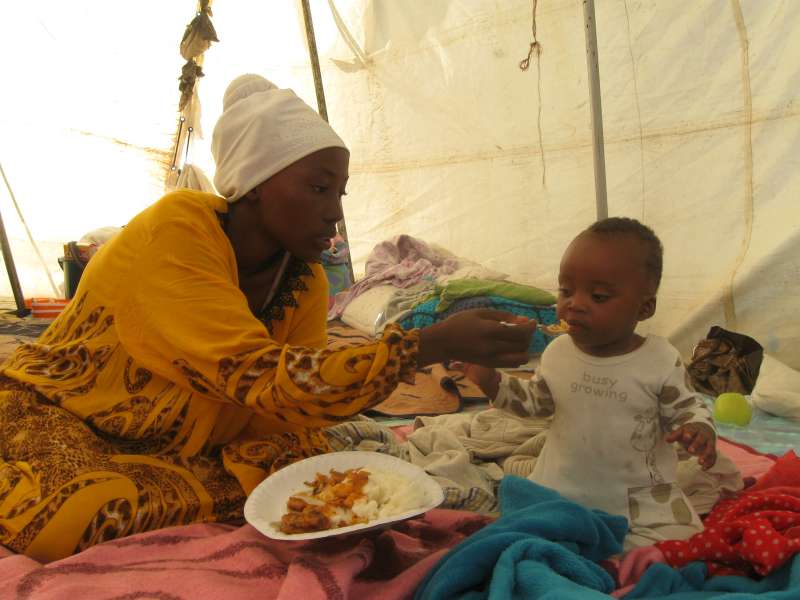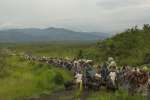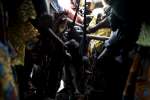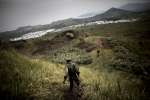- Text size
 |
|  |
|  |
| 
- عربي
UNHCR mulls solutions for refugees affected by xenophobia
News Stories, 26 May 2015
DURBAN, South Africa, May 26 (UNHCR) – Approximately 1,000 Burundian and Congolese refugees who sought new lives in South Africa are turning to the UN refugee agency for help, after xenophobic violence forced them to flee their homes last month.
According to reports, more than 1,200 of the 5,400 people who took refuge in the three shelters of Phoenix, Isipingo and Chatsworth in this port city have been successfully reintegrated into the communities from which they fled. More than 2,000 have voluntarily repatriated to Malawi, Mozambique and Zimbabwe. However, many remain displaced and they favour resettlement.
"UNHCR's position is very clear," says the agency's deputy regional representative, Veronica Modey-Ebi. "While refugees are still displaced and living in a temporary shelter, it is imperative that every effort be made to assist them with safe and dignified reintegration in the immediate term, so that they are able to resume their lives and livelihood activities as soon as possible. Once this happens, only then can we look into longer term durable solutions such as resettlement which is an option available to very, very few refugees."
Resettlement to a third country such as the United States, Canada or Australia is a lengthy process that can take up to three years to finalize. However, many of the displaced, like David Rubango,* who fled persecution in the Democratic Republic of the Congo (DRC) several years ago, say they cannot continue living in South Africa.
"This will be the second time that I have come under attack as a result of xenophobic violence," David says, pointing to a jagged scar on his chest. "I got this scar during the xenophobic violence of 2008. This time, I fled before I could fall victim to the violence again. I cannot keep on being a victim in a country in which I have sought protection."
For Shukuran Kashini, who is also from the DRC, a new job as a cook at a hotel fell through when the violence left her fearing for her life while travelling home at night. Her husband, who had been working as an electrician in another province, was forced to rush home to look after his family.
"He has since lost his job because he took time off work to make sure that his family was safe," says Shukuran. "We have now become destitute." She and
David are among hundreds who believe that the only solution for them is to leave the country and seek protection elsewhere.
"The frustration and fear felt by refugees is understandable," says UNHCR's Modey-Ebi. "However, blanket resettlement is not the solution for everyone. UNHCR has been approached by some who have expressed interest in voluntary repatriation and others favour local reintegration."
UNHCR has finalized the details of a three-tiered refugee reintegration package for an estimated 3,000 people. The package includes rental subsidy for two months, food vouchers for the same period of time and a one-off provision of basic non-food items.
Eighty per cent of the family packages will be provided to facilitate reintegration for refugees and asylum-seekers, while the remaining 20 per cent will assist indigent migrants and host community members.
"This will also go a long way in enabling the reintegration of refugees and asylum-seekers back into their former or new communities," says Modey-Ebi.
Meanwhile, the KwaZulu Natal government and eThekwini Metro task team are holding intensive talks with community leaders on the importance of peaceful co-existence with all foreign nationals.
"This is very important, as it gives us the assurance that every effort is being made to smooth the way for reintegration, which is the solution for the vast majority of displaced refugees at this juncture," explains Modey-Ebi.
As a result of this exercise, many foreign nationals have been welcomed back to their former communities and several have re-opened their businesses.
In addition, the South African government aims to introduce educational activities in schools and other centres to promote a better understanding of refugees, asylum-seekers and other foreign nationals.
"UNHCR's support to this national education drive includes the contribution of thousands of educational materials and literature, not only in KwaZulu Natal, but in the Western Cape, Gauteng and Limpopo provinces," says Modey-Ebi.
"It is a huge undertaking, but we are prepared to go the extra mile to ensure that we support efforts to counter xenophobia on a continuous basis and, in doing so, create an environment conducive to long term local integration, which is the solution for most refugees in the country, including those displaced during the recent xenophobic violence."
* Name changed for protection reasons
By Pumla Rulashe in Durban, South Africa







































